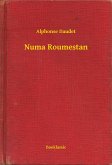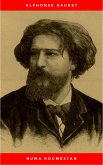Alphonse Daudet's "Numa Roumestan" is a vivid exploration of ambition, social aspiration, and the complexities of human relationships set against the backdrop of post-Imperial France. This masterfully woven narrative employs Daudet's signature naturalistic style, characterized by meticulous attention to the protagonist's emotional landscape and the societal influences shaping his journey. Through the lens of a charming yet flawed hero, Numa Roumestan, Daudet delves into the intricacies of the Parisian social stratification, illustrating the palpable tension between personal desire and societal expectation in a rapidly changing world. Alphonse Daudet, a prominent figure in 19th-century French literature, was deeply influenced by his experiences in the artistic and political climate of France. The son of a successful silk manufacturer, his early life in the south of France and subsequent move to Paris exposed him to diverse societal layers, providing ample inspiration for his works. Daudet'Äôs keen observations of human behavior and intricate depictions of character dynamics are paramount in "Numa Roumestan," showcasing his ability to capture the zeitgeist of his time while exploring universal themes. This engaging narrative is highly recommended for readers interested in the intersection of personal ambition and societal dynamics. "Numa Roumestan" promises to captivate those who appreciate richly drawn characters and profound insights into the human experience, making it a must-read within the canon of French literature.
Dieser Download kann aus rechtlichen Gründen nur mit Rechnungsadresse in A, B, BG, CY, CZ, D, DK, EW, E, FIN, F, GR, H, IRL, I, LT, L, LR, M, NL, PL, P, R, S, SLO, SK ausgeliefert werden.









